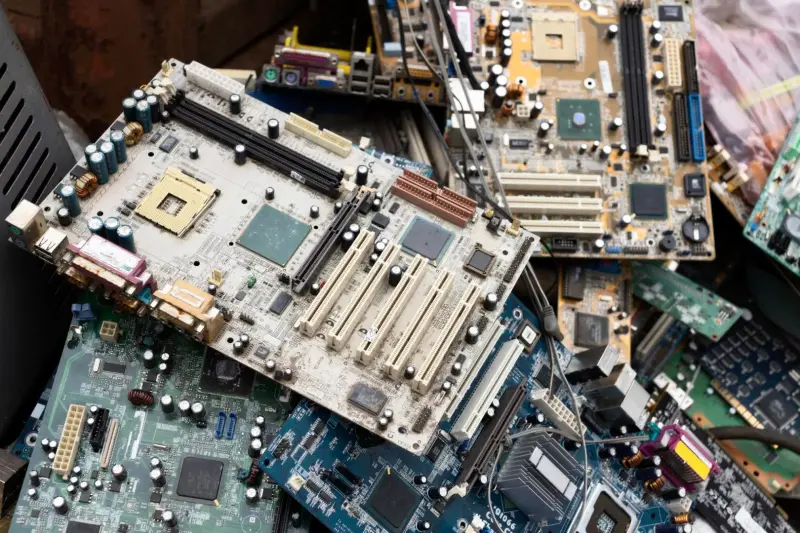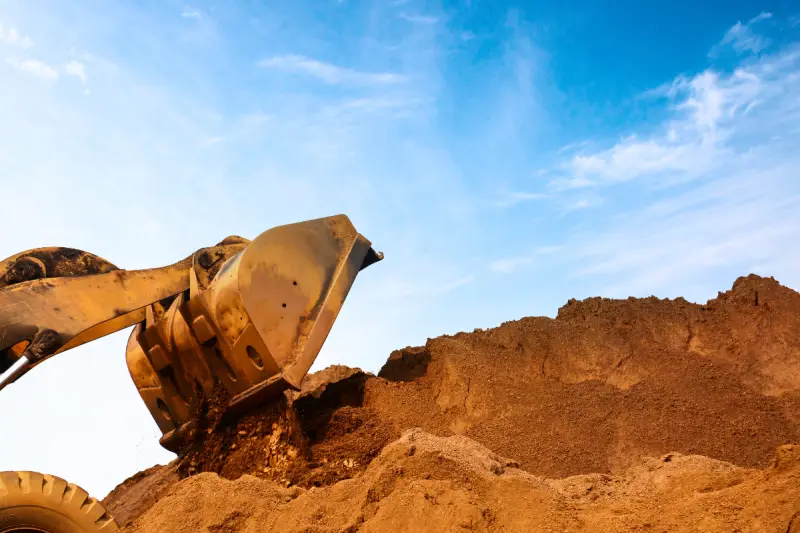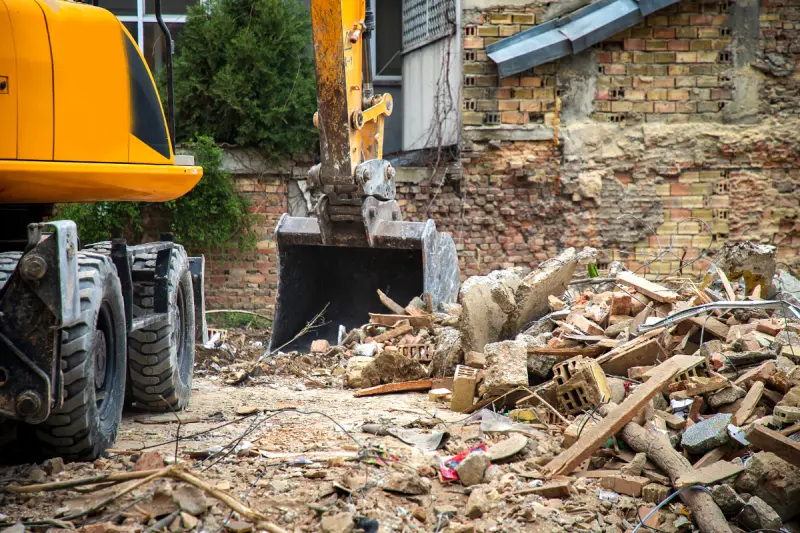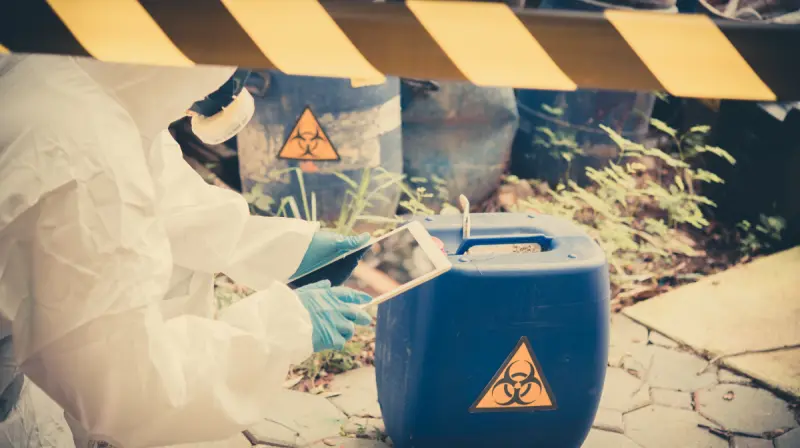We explore the dangers of DIY waste removal. From potential injuries to environmental harm, understand the dangers of tackling waste disposal without professional expertise.
Health & Safety Risks
A well-recognised concern is the numerous health and safety hazards associated with waste disposal. It's crucial to note that this area encompasses various kinds of waste, with each type posing unique risks.
Household waste, for instance, may include sharp items like shattered glass, errant nails or compromised metal artefacts that could potentially cause physical harm. An additional concern is biohazards - food leftovers or medical waste have the potential to harbour numerous harmful bacteria, introducing critical health dangers to the equation.
These factors illustrate why the correct measures and practices must be adopted when disposing of waste; inadequate methods could result in a significant increase in hazards. There's also the risk of exposure to hazardous waste, and it's one of the standout concerns. Items classed under this type of waste include electronic refuse, spent car batteries, paint, garden chemicals, and other similar substances. The shared trait amongst these wastes is that they possess toxic substances.
These substances can potentially induce severe health problems, which range from burns, poisoning, respiratory complications, and beyond. Mismanagement and improper handling of such waste types can greatly amplify these risks. Thus, it underscores the urgency and importance of proper waste disposal protocols, to protect individuals from the likely and severe hazards involved. Not doing so would be a grave oversight, leading to potential health complications that could have a lasting impact.
Time & Energy Efficiency
One of the most overlooked risks associated with doing your own waste removal is the significant amount of time and energy it can consume.
The whole process, which involves separating different types of waste, loading them up, driving them to the appropriate disposal sites, and then getting rid of them safely and correctly, takes huge amounts of commitment and physical effort.
Far more, in fact, than most people realise until they're in the midst of it. A prime example of the time-consuming elements of this job is the step of sorting out which items are recyclable.
It's often not as simple as dividing waste into 'recyclable' and 'non-recyclable' bins. Different materials often need to go to different places including glass, plastic, paper, and metal. They each have their own specific recycling processes.

Once you've successfully identified and separated all of the recyclables, the next step is to find your local recycling centres. This alone can take hours of research and planning, as different centres often specialise in different materials, and their opening hours can vary widely. Then there's the task of making all of those trips to all of those centres. The majority of households only have access to one car, meaning this stage can take multiple days or even weeks, especially if you're dealing with large volumes of waste.
And don’t forget, this is all on top of your normal, everyday responsibilities. But more than just the physical effort and time, DIY waste removal can also be incredibly risky if done improperly. Without being fully aware and understanding the waste disposal regulations that are set by the local authorities, you can inadvertently contravene these. This may lead to fines or penalties, adding another layer of costs and complications to the process.
Environmental Impact
Do-it-yourself (DIY) waste removal may seem like a convenient solution. However, it can unknowingly create a negative impact on our environment. Many of us are not well-versed in correct waste segregation and disposal practices which makes us susceptible to adding to the growing environmental pollution.
Waste, and in particular hazardous waste, when not disposed of correctly, can cause a myriad of environmental issues. Incorrect disposal methods could result in widespread land, air, and water pollution.
Land pollution is caused by waste components that degrade slowly, leading to soil contamination, while airborne toxins released from waste can lead to air pollution. Water bodies can similarly become polluted by harmful elements that seep from waste materials and runoff to streams, rivers, or groundwater.
It's essential to understand that these environmental hazards also pose increasing risks to human health and well-being. Moreover, improper waste disposal methods can also fuel illegal activities such as fly-tipping. This entails the unlawful disposal of waste on roadsides, public places, or private properties, mainly due to the ignorance or avoidance of correct waste disposal practices.
Fly-tipping not only spoils the visual environment but is also actively against local government waste management regulations. It can carry severe consequences, including substantial fines, disposal costs and even potential prosecution. There is thus no doubt about the importance of practising responsible waste management. As members of society, it's our collective duty to ensure we uphold these regulations, for the betterment of our environment and for future generations.
Improper Disposal of Hazardous Materials
The last and possibly most alarming risk connected with do-it-yourself (DIY) waste disposal is the incorrect handling and disposal of hazardous materials.
These materials encompass a wide array of items that may be found in everyday environments, such as certain household items and commercial waste. Household wastes could include everyday items like batteries or electronic waste.
Batteries contain corrosive materials and heavy metals that can be dangerous if not handled and disposed of properly, while electronic waste often has components that contain potentially harmful materials like lead, mercury, and cadmium.

Such items should not be mixed with regular household waste, as they pose considerable risks to the environment as well as to human health if not discarded correctly. On the other hand, commercial waste might encompass things like industrial solvents. Industrial waste, such as solvents, chemicals, and metals, requires specialist handling due to the toxic nature of many of these substances. When not appropriately treated or disposed of, these hazardous materials can have profound consequences on both the environment and public health. Furthermore, managing waste improperly can bring with it severe environmental and health implications.
One of the main concerns with incorrect disposal is the potential for toxic substances to seep into the ecosystem and the groundwater system. The seepage of these harmful chemicals can lead to widespread contamination, posing a major threat to local ecosystems, and damaging wildlife and plant life. This contamination can also infiltrate groundwater supplies, creating a significant risk to human health as the polluted water could easily enter the drinking water supply.
Similarly, the hazards associated with health are not to be overlooked. Inhalation of or direct contact with such substances can have dire health consequences, leading to a variety of potential health problems including skin irritations, respiratory difficulties or even more serious concerns over the long term.
Cost-Effectiveness
Many individuals might believe that doing waste removal by themselves will save them money. Ironically, the financial consequences of DIY waste disposal are often overlooked. At first glance, it may seem to be a cost-effective solution.
However, hidden costs are usually significant and can make the endeavour more expensive than initially anticipated. Several aspects contribute to these additional expenses. One of the major factors is fuel cost. When you're disposing of your own waste, you have to make multiple trips to recycling centres or local waste disposal facilities.
The mileage adds up, leading to substantial fuel costs over time. Vehicle charges, whether from owning a vehicle able to transport waste or hiring one, seriously add to the final bill. Vehicles that can transport sizeable loads of waste are huge and cumbersome, and they aren't cheap to run or rent.
The price you'll pay for the vehicle itself, along with its maintenance and insurance, can add up quickly; it's a cost that's often underestimated.
In addition, when you transport your waste to designated areas such as recycling centres or local authority waste sites, they may impose fees for the handling and processing of certain types of waste. This is especially true for hazardous waste which requires special handling and precautions.
Thus, when you add up all the potential costs, DIY waste removal may not appear to be as cost-effective as it initially seems. Unforeseen costs are usually substantial and can make the process quite expensive, contrary to the common perception.
RB Grab Hire Ltd delivers prompt and consistent grab hire services in Southampton, Portsmouth, Fareham. Contact us today to find out more about our unmatched grab hire and muck-away services.





